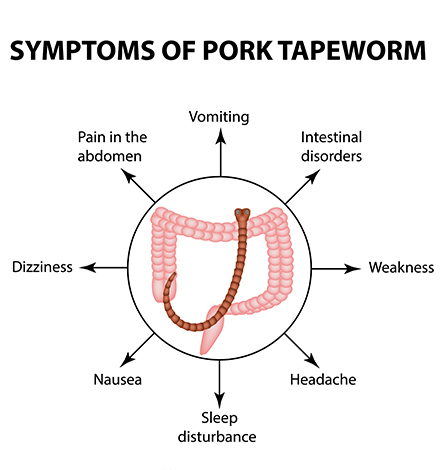Usually, people infected with tapeworm do not have any symptoms. Some may have few symptoms that are mild and non-specific.
The symptoms may occur 6–8 weeks after ingestion of meat contaminated with tapeworm eggs or larvae. During this time (incubation period), the eggs or larvae are fully developed. The symptoms may continue to present till the tapeworm dies after treatment, or it may live for several years.
In case of cysticercosis caused by T.solium, the incubation period may vary and may not present any symptoms for years. In certain endemic regions, especially Asia, palpable (that can be detected by touch) or visible nodules may develop beneath the skin.

Symptoms of tapeworm infection can vary based on various factors, such as the type of tapeworm, the geographic location, the incubation period of that tapeworm etc. The symptoms presented by adult and larval tapeworm infection may also differ.
The symptoms of adult tapeworm infection include:
- Segments from the tapeworm or larvae in the stools
- Pain in or above the stomach
- Discomfort in the upper abdomen
- Diarrhoea
- Loss of appetite
- Nausea or vomiting
- Weight loss
- Dizziness
- Insomnia
- Malnutrition
The symptoms may vary depending on the type of tapeworm that has infected. Pork or beef tapeworm infection can cause an increase in appetite.
Fish tapeworm infection rarely causes vitamin B12 deficiency, as the tapeworm absorbs this vitamin. Vitamin B12 is essential to produce red blood cells; so, its deficiency can cause anemia.
Certain tapeworms do not develop into adult in the intestine. Rather, their larvae penetrate the intestinal wall and enter the host’s bloodstream. The larvae then travel to other tissues and organs in the body.
The symptoms of a tapeworm larvae infection differ according to the type of tapeworm, the severity of the infection and the part of the body is infected. Some of the symptoms include:
- Pain or discomfort in the abdomen
- Cough or pain in the lungs due to an abscess
- Fever
- Cystic masses or lumps
- Headaches
- Jaundice
Neurocysticercosis, the tapeworm larvae infection of the brain, can cause severe, life-threatening symptoms after several years of the initial infection. The cysts in the brain and meninges (tissues covering the brain) can cause symptoms like:
- Seizures
- Chronic headaches
- Confusion
- Hydrocephalous
- Dementia
In rare cases, the cysts can develop in the eyes and may cause blindness. They can also infect the spinal cord and cause muscle weakness or paralysis.